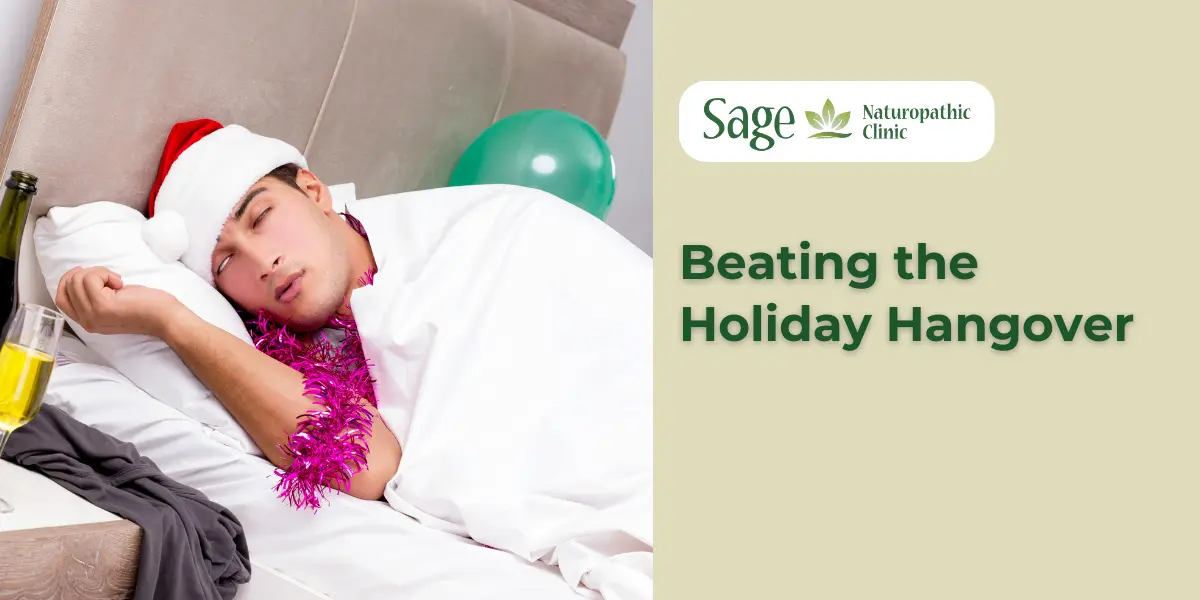
‘Tis the season to drink and be merry but often, the day after can include a hangover that can be uncomfortable and make for an unproductive day. We can’t always plan for these occasions but there are a few steps we can take along the way to minimize the impact of alcohol and reduce the impact of the holiday hangover.
Why do we get hungover?
We experience being hungover because alcohol is a diuretic. It causes dehydration and the loss of electrolytes. It also causes the loss of several B vitamins. As a result, you may experience headaches, fatigue and thirst.The fluid loss can also lead to an electrolyte imbalance (sodium, potassium, magnesium) causing irritability and weakness. Further the alcohol can irritate the stomach lining, causing nausea and vomiting. Excessive alcohol intake can also interfere with sleep, reducing its overall quality. The metabolism of alcohol creates toxic byproducts like acetaldehyde and although the liver eventually converts this byproduct and eliminates it, it takes time and this can lead to nausea, sweating and headaches. Lastly, alcohol can disrupt hormones like cortisol and serotonin, leading to irritability or “hangxiety”
How you can lessen the impact of alcohol
1. Stay Hydrated
- Alcohol dehydrates your body, so drink plenty of water before going to bed and first thing in the morning. Try alternating an alcoholic beverage with a glass of water as this can mitigate the negative impact of the alcohol
2. Add Electrolytes
- Adding electrolytes (like a sports drink or coconut water) can help replenish lost minerals.
- Avoid caffeine as it can worsen dehydration; instead, sip herbal teas for a gentle pick-me-up.
3. Replenish Lost Nutrients
- Take a B-complex vitamin to help replenish B vitamins that alcohol depletes, or take vitamin C to support your immune system.
- Magnesium-rich foods like nuts and leafy greens may help with muscle relaxation and prevent cramping.
4. Consider Natural Remedies
- Ginger tea can help soothe nausea, and peppermint oil applied to your temples may alleviate headaches.
- Honey, which contains natural sugars, can help your body metabolize alcohol more efficiently.
5. Be Mindful of Over-the-Counter Remedies
- Avoid taking acetaminophen (like Tylenol) after drinking, as it can be hard on the liver. Ibuprofen may be a better option for headache relief, but it can irritate the stomach, so take it with food.
6. Nourish Your Body with the Right Foods
- Eat foods rich in potassium and other electrolytes, like bananas, avocados, and leafy greens, to help restore what you lost.
- Go for a balanced meal with complex carbs (like oatmeal), lean proteins, and healthy fats to stabilize blood sugar levels, which can drop after a night of drinking.
7. Catch Up on Sleep
- Alcohol disrupts your sleep, which can worsen hangover symptoms. Try to catch a few extra hours of sleep or take a nap to allow your body to recover fully.
8. Get Some Fresh Air and Light Exercise
- A light walk or gentle stretching can help increase circulation and oxygenate your blood, which helps your body metabolize alcohol more quickly.
- Sunlight exposure helps reset your body’s natural rhythms and can improve mood, which is sometimes impacted by hangovers.
Dr. Rahima Hirji, ND
Naturopathic Doctor, Clinic Co-Owner
Sage Naturopathic Clinic